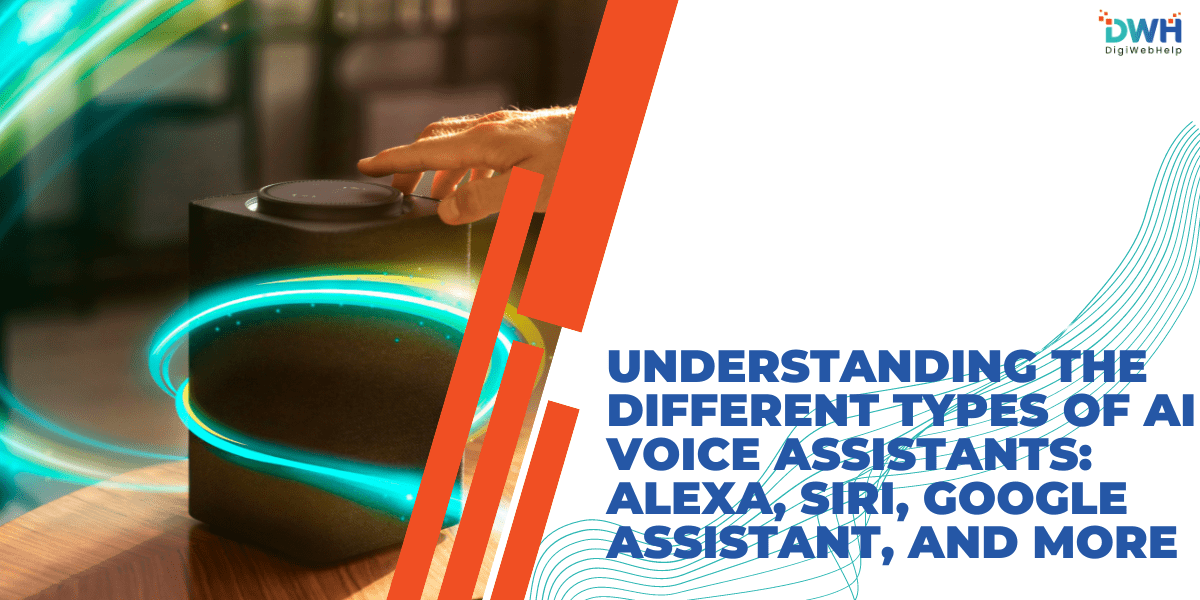
Understanding the Different Types of AI Voice Assistants: Alexa, Siri, Google Assistant, and More
AI voice assistants are rapidly becoming a part of our everyday lives, helping us perform tasks through simple voice commands. From controlling smart home devices to responding to queries, these digital assistants are evolving quickly.
This blog will explore what AI voice assistants are and how they operate. We will also compare major players in the space, such as Amazon’s Alexa, Apple’s Siri, and Google’s Assistant. Understanding the differences between these voice assistants is crucial for businesses and users to make informed decisions based on their specific needs.
What Are AI Voice Assistants?
AI voice assistants are software programs that use natural language processing (NLP) and machine learning to comprehend and respond to voice commands. They interpret spoken words and process them to provide relevant responses or perform a task. The interaction is made possible through advanced algorithms that allow voice assistants to learn from user interactions. This learning curve improves its accuracy over time.
Evolution of AI Voice Assistants
The concept of voice-activated devices roots date back to speech recognition systems in the 1960s. However, it was not until 2011 that voice assistants hit the big time amid the rise of Apple’s Siri. Soon after, we saw Google Now in 2012, Amazon’s Alexa in 2014, and Google Assistant in 2016. These developments marked significant advancements in AI. The evolution helped provide more natural and intuitive user experiences.
Key Functions
AI voice assistants are designed to perform a variety of tasks. Common functions include:
- Setting reminders and alarms
- Answering questions
- Controlling smart home devices
- Playing music and media
- Managing daily tasks
- Providing weather and traffic updates
- Handling routine tasks
Amazon Alexa
Alexa is one of the most widely recognized AI voice assistants. It is integrated into various devices, such as Echo speakers, smart displays, and several third-party devices. Alexa is at the heart of Amazon’s smart home ecosystem, designed to make voice interaction a seamless experience.
Features and Capabilities
Alexa is known for its exceptional ability to connect with a diverse array of smart home devices. It lets users control devices like lights, thermostats, safety systems, and other appliances with voice commands. Plus, Alexa Skills—third-party applications—extend its functionalities to include games, meditation, cooking instructions, and other interactive experiences.
Strengths and Weaknesses
Alexa’s strength lies in its extensive compatibility with smart devices and boasts a strong skills ecosystem. However, its performance may fall short if exact voice instructions aren’t used. It may not seamlessly integrate into non-Amazon services compared to its competitors.
Use Cases
Alexa is commonly used in smart homes to operate devices, manage shopping lists, and even make purchases on Amazon. In the business world, Alexa is used for scheduling meetings and providing hands-free assistance in tasks. The AI assistant can also be integrated with business software.
Apple Siri
Siri is an AI voice assistant created by Apple. It was the first AI voice assistant to gain popularity. Siri was integrated into iOS devices like iPhones, iPads, and Mac devices. The voice assistant is a key component of Apple’s ecosystem. It provides users with a seamless experience bridging across other Apple services.
Features and Capabilities
Siri is designed to perform a variety of tasks through voice commands. It can send messages, set reminders, and play music. It offers a unique feature called Siri Shortcuts. This lets you create your own voice commands for specific actions in different apps to enhance their usability.
Strengths and Weaknesses
Siri’s integration with Apple devices and services ignites its strength, providing a seamless experience for those in the Apple ecosystem. However, Siri’s capabilities are sometimes considered limited compared to those of its competitors. This is particularly true regarding its compatibility with smart home appliances and third-party integrations.
Use Cases
Siri is often used to control iOS devices hand-free. It can make phone calls or send messages. It’s also helpful in business settings, particularly in organizing calendars, setting reminders, and using information from Apple’s productivity apps.
Google Assistant
Google Assistant is Google’s AI voice assistant, integrated across a wide range of gadgets, including Android phones, Google Home Speakers, and smart displays. The voice assistant is renowned for its advanced natural language processing capabilities and deep integration with Google’s suite of services.
Features and Capabilities
Google Assistant excels in understanding context and handling intricate queries, thanks to its integration with Google Search. Moreover, it offers robust smart home control, making it simpler for users to operate compatible devices with ease. Plus, it comes with a routine feature – predefined actions triggered by specific commands, enhancing user convenience.
Strengths and Weaknesses
Google Assistant’s major strength is its search capabilities and the ability to handle natural and conversational interactions. However, its performance may vary depending on different devices. Also, its integration with non-Google services might not be as seamless as expected.
Use Cases
Google Assistant is widely used to manage daily tasks. It can set reminders, run smart home devices, and navigate routes on Google Maps. In business settings, Google Assistant is valuable for finding information quickly, scheduling meetings, and integrating with Google Workspace.
Other AI Voice Assistants
- Microsoft Cortana
Cortana, developed by Microsoft, was initially integrated into the Windows operating system and offered productivity-related features. The presence of Cortana in the consumer market has diminished. Microsoft is now more focused on business applications.
- Samsung Bixby
Samsung designed the Bixby voice assistant specifically for Samsung devices. It offers unique features like Bixby Vision for an augmented reality experience and deep integration with Samsung’s ecosystem. However, Bixby is not as famous as Alexa, Siri, or Google Assistant.
- Emerging Voice Assistants
There are other notable voice assistants like Alibaba’s AliGenie and Xiaomi’s XiaoAI that are gaining traction in certain areas, especially in Asia. These platforms are designed to fit local languages and cultures. They offer localized services that cater directly to specific user needs.
Comparing Voice Assistants: Alexa vs Siri vs Google Assistant
- User Interface and Experience
People often choose Google Assistant for its conversational abilities. Meanwhile, Siri stands out with its simplicity and seamless integration into iOS. Alexa, with its extensive skills library, offers a personalized experience. However, it may require a steeper learning curve for non-Amazon services.
- Compatibility and Integration
Alexa specializes in compatibility with a variety of smart devices and supports a wide range of third-party products. Siri is the top AI assistant for users heavily embedded with Apple’s suite of products. Google Assistant shines in its seamless integration with Google’s various services and Android devices.
- Privacy and Security
Privacy is a key concern for many users. Apple positions Siri as the most privacy-conscious AI assistant, with most of the data processing occurring on-device. However, Google and Amazon have also implemented various privacy features. However, they rely more on cloud processing, which can raise concerns for some users.
Conclusion
AI voice assistants are becoming an integral part of our lives, offering convenience and boosting productivity. By understanding the key differences between types of voice assistants, users can choose the top AI voice assistant that best suits their needs. As these technologies continue to evolve, they’ll have a more significant role in shaping our interactions with the online world.
Transform your workflow with AI voice assistant services designed to boost efficiency and enhance user experience. Discover the power of an AI voice assistant customized to meet your specific business needs today.










